'I felt I got punished for having children' - Motherhood: One of sport's final barriers
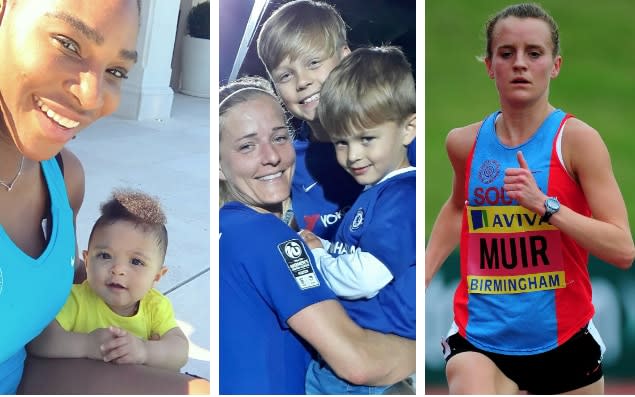

‘I felt I got punished for having children.” Former England footballer Katie Chapman’s damning words have a weighted weariness to them. As she speaks, the hurt is still very much apparent. One of England’s biggest stars at the time, when she asked to miss a training camp in 2011 for childcare reasons, her international career came to an abrupt halt. It would be four years, and a new manager, before Chapman received another call-up. She missed a World Cup, a home Olympic Games and lost the financial help her central contract provided.
“I didn’t feel supported by the FA at that point, I felt pressure,” she says now. It is not a palatable message of empowerment. Nor is it a wonderful shot of an athlete, child on hip, posting their epic victory as a new mother. It is an alternative reality of the sporting mother, one of a constant fight to remain relevant in a profession where having a child could mean you are written off. It exists along with so many others in the shadows of the spotlight given to remarkable mothers competing at the upper echelons of elite sport.
Nothing exposed those conflicting narratives more starkly than US sprinter Alysia Montano’s fightback against Nike earlier this year. “Nike told me to dream crazy, until I wanted a baby,” she told the New York Times of the hypocrisy behind the sportswear company’s viral ad campaign championing Serena Williams’s comeback while she experienced quite the opposite.
Speaking out sent shockwaves, with Nike since reviewing its maternity policy to waive pregnant athletes’ performance-based targets for 12 months.
Just as with the average woman, elite sport stars’ journeys in motherhood vary greatly. While some choose to jump back into competition, others take a break. While some are mothers in their 20s, others start families in their 40s after retirement. And where some are supported to the ends of the earth, others must grapple with professional sport’s often unaccommodating environment.
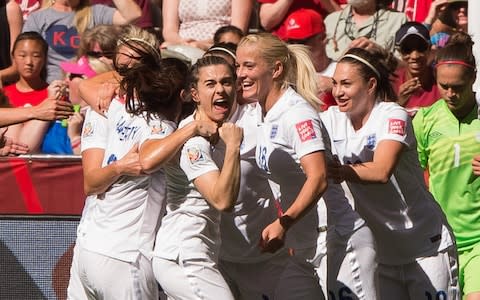
Chapman became a working mother at 21 when she gave birth to the first of three sons. Physically, she did not find it hard to come back, the difficulty instead lay in being part of an organisation that did not facilitate for mums. Despite enjoying largely positive experiences during her trophy-laden club career, including at Arsenal and Chelsea, her England career was “always a battle”. Whereas her sons had often travelled on the team bus with her clubs, at England, she says they were often unwelcome. The FA declined to comment on Chapman's experiences but did say the current central contracts have a maternity policy in place.
As the only mother in the England squad for a large stretch of her career, Chapman felt her voice went largely unheard. Meanwhile, help was not just at hand elsewhere, but embedded into the framework. The US Women’s National Soccer Team (USWNT) introduced a childcare policy as far back as 1996, including allowing children into training camps, paying for their travel and the cost of a nanny. Such is the culture that when head coach Jill Ellis gave her final press conference for the team earlier this month, her daughter Lily sat next to her with her own namecard set out on the desk.
Meanwhile, when Chapman’s then four-year-old son Harvey went with her to China for the 2007 World Cup, he was not allowed to eat with the team.
“We had our own chef out there cooking for us, the Japan team were there and a player had their child eat with them, but mine wasn’t allowed in. I was sneaking food out to give to my child. It was like hitting a brick wall. When you’re standing on your own, sometimes it’s not as powerful as everyone standing with you.”
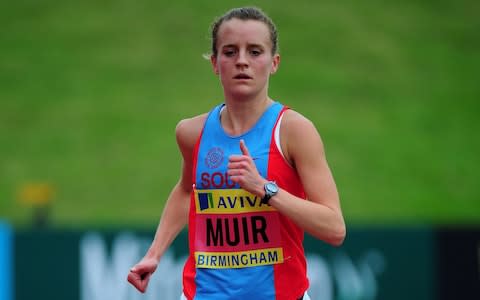
Former GB marathon runner Tina Muir says she too felt isolated, battling for nine years with amenorrhea, the absence of a menstrual cycle. Doctors told her that her 90-mile weekly marathon training was impacting her chances of starting a family, so Muir decided to retire at 28. She faced a backlash from her peers. She says she now realises her amenorrhea was also affected by the eating disorder she had developed during her career, and did not take that into account when she announced her retirement. “Looking back now, I can totally see why their reaction was what it was, but it wasn’t positive,” she says. “I think it maybe put pressure on some who had irregular periods and making them confront things that they weren’t quite ready to do.”
Tracey Neville faced judgment too when she announced in June that she would be stepping down as England netball head coach after the World Cup to focus on having children. There were murmurs online: “Why can’t she do both?” Then Neville revealed she had suffered a miscarriage the day after England won their monumental Commonwealth title in 2018, and explained her decision further, saying: “I need this time out.”
Many sportswomen feel they need to choose between a career and motherhood.
This year Danish badminton player Kamilla Rytter Juhl stepped back from her sport since having a child with her doubles partner Christinna Pedersen, with whom she won an Olympic silver medal in 2016. England netballer Geva Mentor spoke to this paper in July about her plans to freeze her eggs so she could have options in retirement. Other major stars such as Steffi Graf, Rebecca Adlington and Mia Hamm waited until the end of their careers before having children.
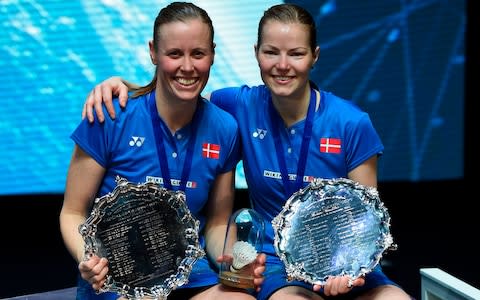
Other athletes who attempt the post-baby comeback do not always make it back to the bright lights and podiums. After having two children, British rower Anna Watkins set the ambitious aim to defend her Olympic title at Rio 2016.
But she had to withdraw from the GB programme, admitting she was not at the required level. “I would have always wondered what might have been if I hadn’t given it a go.” Serena Williams, the 22-time Grand Slam champion, has spoken candidly of guilt-tripping herself for sacrificing time with daughter Alexis Olympia, two.”I don’t think I’m doing it right,” she said in 2018. If one of the most recognisable and successful sportswomen ever struggles to juggle, what hope does the rest of the world have?
It is a delicate balance, and ultra-marathoner Lowri Morgan, 45, has gone to drastic lengths to capitalise her time with her son Gwilym, four. To log the kind of training miles it takes to become one of just two women to have ever completed the 350-mile non-stop footrace in the Arctic, Morgan runs overnight for 60 miles in the Brecon Beacons once a month (in addition to all her other training and work as a broadcaster). She begins at 9pm, head-torch on and alongside a running buddy, and finishes at 7am, all so she can be home in time for the school run.

“I remember once I was so tired I was hallucinating, I saw a unicorn in a field. So I micro-napped for a minute. I know many parents will say the same, they never thought they’d be able to survive on a lack of sleep, but it’s needs must.
“You see the glory. But you don’t know what’s been going on beneath the story, the sacrifices and craziness of life.”
But the hope is that with progress on childcare and maternity policies, it will become more manageable. New Zealand cricketing couple Amy Satterthwaite and Lea Tahuhu this summer announced that Satterthwaite was expecting their first child, no doubt buoyed by the team’s new contract agreement that guarantees her full annual retainer. Cricket Australia last week published its own pioneering policy, which includes childcare.
Alongside that, acknowledging women do not need to have starry, miraculous comebacks to be valued is important. “When I stopped running to have children I think I thought there were two extremes: never run again or prove to everyone and run for GB again,” Muir says. “I think that’s often why people are scared to stop their sport to have a child.”
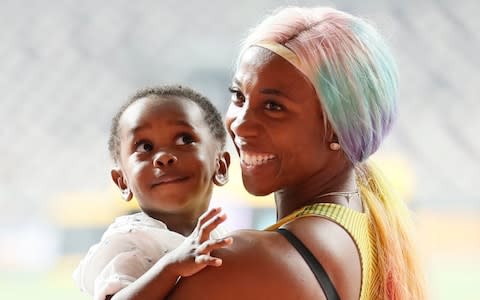
She says telling the stories of elite athletes who have transitioned out of competition for motherhood, and have not disappeared from the face of the earth, is just as important as championing the overachievers who do both.
Shelly-Ann Fraser-Pryce, after winning her fourth world 100m title and completing her lap of honour with her two-year-old son Zion, said it best: “I hope I can give inspiration to all the women thinking of starting a family. You can do anything.”
The sporting ambitions of women postpartum can be far-reaching and awe-inspiring. But within the notion that mothers can do “anything” should also run the caveat that that can also mean “as much as they want to” and “providing they have the right support”.

 Yahoo Sport
Yahoo Sport 





































